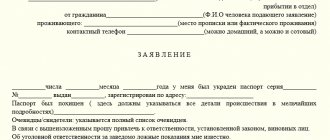How long can you go without registering your property?
Often the testator simply does not have time to leave his will and reflect it through a will. In some situations, inheritance documents have not yet been fully completed. This means that only those persons who are the closest relatives of the testator can claim the inheritance.
If the testamentary document is ready, then the situation is even simpler. Thus, individuals simply need to appear at a notary’s office after the deadline has passed and properly formalize their rights to the property of the deceased person.
The law sets a period of 6 months for a person to put his documents in order, say goodbye to the deceased, and then begin the procedure for entering into the right of inheritance. Entry into inheritance rights is not permitted before six months.
The six-month period begins to run from the moment the death of the person occurs. Also, the beginning of the expiration of the six-month period is marked by the fact that the date of entry into the inheritance opens, and after this time the person has every right to claim his rights to the inheritance.
But, as we said above, very often the heirs do not know how to dispose of their rights. Someone misses the six-month deadline, someone, on the contrary, does not know what to do, or they have not decided whether they need to enter into an inheritance or not.
In fact, if 6 months after the death of the testator a person has not entered into an inheritance, then this is grounds for refusing him such actions. But the essence changes when reasons and reasons appear that are weighty, and therefore allow you not to enter into an inheritance on time. What reasons are we talking about?
To go to court or not
Important! If the heir did not manage to assume his rights within the prescribed period, there are two ways to receive the property:
- through the court,
- by agreement with the heirs.
The second case is practically impossible. As a rule, no one wants to share an inheritance that they have already received. However, it is worth trying to come to an agreement with relatives. It is quite possible that they will agree to cede part of the inheritance.
The second method is a real chance to prove the right belonging to the heir by law.
It should be used in the following cases:
- if the heir of the second priority refuses to share the inheritance received,
- if the heir who missed the deadline was the only applicant to receive part of the deceased’s property,
- if the heirs of all orders missed the deadline for entering into inheritance rights.
As a rule, the first method is used more often. Although it is long, it is effective. Especially when the second-priority heir took possession of the property illegally, for example, deliberately did not warn the primary heirs about the possibility of obtaining the property.
Attention! Our qualified lawyers will assist you free of charge and around the clock on any issues. Find out more here.
Grounds for not entering into an inheritance for 6 months
There are good and bad reasons that may influence the fact that the heirs simply could not assume their rights as recipients of property. First of all, we will consider those conditions that are respectful and allow the heir to be somewhat late in completing important papers.
- The first reason is the illness of the future heir. Especially if it is associated with treatment in an appropriate institution. The main thing is that the heir has a document that confirms the fact that he simply could not help but show up to complete the paperwork, and therefore felt unwell.
- The second reason is the impossibility of appearing due to the absence of an heir. For example, due to work he was sent on a long business trip, or due to valid reasons, for example, the illness of a distant relative, he simply could not appear for registration.
- The third condition is the absence of documents. For example, loss of a passport, its re-issuance.
- If the heir was not notified of the death , but the testator registered all his property in the name of the above-mentioned person, then the deadline for entering into the inheritance can be extended due to the above reasons, provided that there are no other recipients of the will by inheritance or dependents.
Deadline for entering into inheritance according to law and will
After the death of a citizen, all his property passes to close relatives or persons specified in the will. If one of the heirs does not enter into rights, then the opportunity to take possession of the property of the deceased arises from another category of heirs, for example, distant relatives.
Attention! A citizen has the opportunity to inherit property in two cases:
- if he is a close relative of the deceased,
- if the deceased included it in the will.
You can enter into inheritance rights only after six months from the date of death. If the period for entering into inheritance has expired, the heir has the right to apply to the court for its restoration.
If the direct heir wishes to relinquish the property, the property passes to the secondary heir. In this case, the entry period is reduced by exactly half and is three months.
Conditions for this procedure
In order to accept the inheritance, regardless of the fact that the six-month period has expired, an application must be drawn up and submitted to the court. The application must include a valid reason.
The second condition is the fact that it can be accepted even after the six-month deadline and without going to court, only if all other heirs agree to this. However, such an application must be submitted in the presence of a notary in accordance with Article 1153 of the Civil Code.
The consent of the remaining heirs must be mentioned in writing.
What is DNP
DNP is a non-profit organization that is created on a voluntary basis and deals with general issues: cleaning and security of the territory, water and gas supply, garbage removal, road repair, and so on. All improvement activities are financed by membership fees - entrance, regular, targeted and additional. Decisions on the distribution of funds received are made at general meetings.
The dacha non-profit partnership has common property. These are land plots on which driveways, roads, utility networks and service buildings are located, as well as real estate intended for general purposes (for example, a watchman’s trailer).
According to the Constitution of the Russian Federation, citizens cannot be forced to join or remain in any associations. No one can force you to become a member of the partnership, but in practice this decision is often made under pressure from members of the partnership. Sometimes the cost of living in a country house is much more expensive than utilities for an apartment in the city center, and the level of DNP can be different - from plots in an open field to cottage villages with their own infrastructure.
Step-by-step instructions: what to do and where to go?
There are two ways that will allow you to become the owner of an inheritance even if you missed the deadline.
The first method involves filing a claim if there were good reasons.
- First of all, it is necessary to draw up such a statement of claim. It should contain all the information about the author of the application, as well as describe the reasons why the omission occurred.
- Next, you need to attach documents that will confirm your words.
- The court will consider your application. If it turns out that your application was made legally, a trial date will be set.
- The court will familiarize itself with the reasons stated by the plaintiff, and in the course of the hearing will make a decision on whether they are valid or not.
- If they are, it means that the missed deadline will be restored. A new period, called restored, will begin to run.
The period from this day will begin to be calculated from the moment the court makes its decision. If the omission is not considered valid, then the claim will not be satisfied, which means that the heir will not be able to assume legal rights.
The second method is called extrajudicial, which means it is not associated with going to court. There is no requirement to go to court, which means you do not need to file a claim.
- However, you need to make a written statement in order to familiarize other heirs with such a statement.
- Together with a statement of request to restore the missed deadline, you must appear at the notary's office.
- At the same time, notify other heirs that they need to appear within the specified period.
- Next, you need to familiarize the heirs with the will, as well as the reasons why you missed the deadline.
- If the heirs decide that the reason is valid, then you can enter into inheritance rights. However, if it turns out that you missed the deadline for no good reason, the heirs may refuse. This means that all you have to do is go to court, or accept the reality.
Pre-trial settlement
Pre-trial settlement means that you do not go to court, but resolve the issue through mediation with the remaining heirs. Your task is to convince them that it is not up to you to miss the deadline granted by law for entering into an inheritance.
However, if the heirs decide that you are trying to deceive them, or your statement with the arguments set out in it does not seem plausible to other heirs, then you will need to resolve the issue through the courts.
We obtain written consent from all heirs
If you come to the notary and intend to notify all the heirs that you are claiming an inheritance even after the allotted time for carrying out this procedure, then you not only need to obtain the consent of the remaining heirs, but also collect written confirmation of this from them.
In order to obtain written consent, you need to properly acquaint the heirs with why you missed the deadline. Convince them that this happened through no fault of yours.
However, if they side with you, then ask them to document the fact that you are allowed to inherit. To do this, it is necessary to put written permission on an A4 sheet so that the period for entering into the inheritance begins to run again.
Certificate of ownership
The notary is present when drawing up written agreements. Once all the heirs have implemented their will in writing, the notary can draw up an agreement, according to which the period begins to be calculated anew.
Of course, such a paper must be properly certified and attached to the will. The notary must enter the preparation of such an act in his register. As soon as all actions are completed and the deed is signed by a notary, the period begins to be calculated anew, and the failed heir has the opportunity to claim the property again.
About the heirs
A citizen receives the status of heir in two cases:
- If he is a relative of a deceased citizen and is included in the immediate line of inheritance. Current legislation defines 8 lines of heirs. The first includes his wife, children and parents. They are the first priority contenders for the inheritance. If the heirs of the first stage abandoned the property or were recognized as unworthy heirs, then representatives of the second stage are called upon to inherit, etc.
- A citizen is an heir under a will. If the testator has drawn up an order, then the distribution of the inheritance will occur in accordance with the text of this document. A citizen has the right to transfer all his property to third parties, depriving his legal successors of inheritance.
Regardless of the method of inheritance, property is received through a notary. The applicant must submit documents to the notary's office within six months from the date of death of the testator. Next, he receives a certificate of right to inheritance, becoming the full owner of the alienated property. If the received object is subject to state registration, then the heir must subsequently appear with a certificate at the registering authority and re-register it in his name.
There are situations when one of the heirs did not enter into the inheritance and did not formalize the notarized refusal. The reasons for this may be the following:
- the citizen does not want to receive the property of the testator and thus initiates a passive refusal;
- the applicant does not know that he is the heir of the deceased (most often this happens in the presence of wills);
- the person does not know about the death of the testator.
Jurisdiction: where to apply?
If the case is resolved not before a notary, but in a court of law, then you need to contact the district authority. This must be done at the location of the defendant, that is, other heirs. However, you can apply to other district authorities.
Documents for the claim
When filing a claim in court, remember that you need to create a package of documents.
There you need to attach your passport, the claim itself, as well as documents that prove the fact that you really had grounds for missing the deadline.
Also pay a state fee of 250 rubles.
Proof
The evidence may be a certificate from a medical institution stating that at the specified time you were undergoing long-term treatment, or you were undergoing medical procedures, operations, and so on. Also, perhaps you have a document from your employer stating that at the time you were supposed to take over the inheritance, you were on a long business trip.
Residence in another country, and the lack of notification of death is the basis for you to include papers about this.
Drawing up a statement of claim
The statement of claim is drawn up in accordance with the available template. Thus, the statement of claim is drawn up on an A4 sheet in printed font. It contains information about the applicant and the respondent.
It is also necessary to indicate the reasons that served as the reason for contacting the relevant station. So, you need to put a date and signature.
Time limits for consideration of the case and execution of the court decision
To consider the case, you must wait a period of one month.
Sometimes this period passes a little faster.
The court decision comes into force immediately after its adoption.
The bailiff monitors the execution of the decision.
State duty and expenses for lawyers and attorneys
The state fee for applying to such an authority is 250 rubles. On an individual basis, you can seek help from a lawyer or lawyer. Their services are paid privately and are set on an individual basis.
Where to appeal if you lose?
If you lose your case, you always have the opportunity to go to arbitration. This must be done within 10 days from the moment the decision was made.
Learn about the order of succession, including the first order. Also read about the types of heirs: minors, commorients, unworthy, obligatory, disabled and heirs by right of representation according to the law.
“Was it beneficial for the Village Council that no one should take over the inheritance?” Notary comments
“We have the following situation. On June 19, 2020, the owner of the house died (Plusy), in our case Ivan U. He has a brother, Alik U. This house belonged to their parents, who also died. The brother of the deceased arrived, was buried, and he turned to the Plyussky village council for clarification about entering into an inheritance - a house. The village council said that you need to wait the next six months and only then enter into the inheritance. 6 months passed, we turned to the village council again. They said that six months had expired, and where were you before? As a result, as it turned out, in accordance with the legislation of the Republic of Belarus, the general period for entering into an inheritance is 6 months from the date of its opening. Unfortunately, the brother of the deceased did not know about this fact. In the end, it turns out that it was beneficial for the village council that no one should take over the inheritance?
We ourselves are from Latvia. Please tell me what needs to be done to accept the inheritance after the expiration of the six-month period? Can all this be done remotely? And how much will it be?" ( Eugene ).

Photo by Alexander CHUGUEV from the VB archive is for illustrative purposes.
, a notary of the Mogilev notary district, advises :
– Dear Evgeniy! According to the general rule established by the Civil Code of the Republic of Belarus, an inheritance can be accepted within six months from the date of its opening (that is, from the date of death of the testator). Foreign citizens and stateless persons in this case have the same rights and obligations.
You can accept an inheritance in the following ways:
- by submitting a corresponding application to the notary at the place of opening of the inheritance. This is possible, including through a representative to whom a power of attorney with similar powers has been issued;
- having actually taken possession or management of the inherited property. In this case, an application for a certificate of inheritance can be submitted after the expiration of the 6-month period, but acceptance of the inheritance must be confirmed by documents.
Such documents may be:
- certificates of place of residence and family composition, confirming the residence of the heir on the day of opening of the inheritance or for the next 6 months at the same address as the testator or in the inherited residential premises,
- a certificate (it can be issued by the village council) stating that, within the period established by law for accepting the inheritance, the heir used the inherited property, took measures to preserve it, cultivated the land plot, carried out routine repairs, etc.,
- a document confirming the costs of maintaining the property,
- a copy of the court decision that has entered into legal force establishing the fact of acceptance of the inheritance, other documents.
If the heir missed the deadline for accepting the inheritance, and he did not perform any actions that could be regarded as actual acceptance of the inheritance, then in order to avoid lengthy legal proceedings, he can agree on the receipt of the property intended for him with other interested parties. To do this, he must obtain written consent from all other heirs who accepted the inheritance.
If the deadline for accepting the inheritance is missed by the only heir, or all heirs missed this deadline, or there is no consent from the heirs (or it is impossible to obtain), then you only have to file a claim for recognition as having accepted the inheritance to the court at the place where the inheritance was opened.
If you, as a foreign citizen, are unable to personally submit an application or obtain a certificate, you can draw up a power of attorney to perform such actions for your representative.
If the notary, when drawing up a certificate of inheritance, needs relevant information or documents for the issuance of which a fee is provided, such a fee will need to be paid. For the performance of notarial acts by notaries and the provision of legal and technical services by them, a notarial fee is also paid.
How much it costs to enter into an inheritance - also read in detail here.
Is it necessary to receive it?
It often happens that the heir is bequeathed property that has debts and encumbrances. You don't always want to inherit something like this. In this case, you need to refuse the inheritance. You may simply not come to receive it, or write a refusal in writing to a notary.
Who will get the property?
If the property was not inherited, that is, no one showed up, then after the expiration of the statute of limitations, that is, 3 years, it becomes the property of the state. The property can be sold at auction or used for government needs.
What are the deadlines for accepting an inheritance?
To avoid confusion and fraud, the state level has established uniform deadlines for registration of inheritance after the death of a citizen.
If each successor were allowed to independently determine the time of entry into inheritance rights, then the process of distribution of property would be disorganized and confusing. First you need to figure out where to go for your part. A notary is responsible for issuing an inheritance, so you need to visit the office at the place of residence of the deceased. If the period for registering the property has expired, you will have to go to court or to other successors to conclude an agreement.
First-degree relatives have six months at their disposal to submit an application for registration of inheritance. This period is the same both when distributing the property of the deceased according to the law, and according to the last will of the deceased. For each action upon entering into inheritance rights, a certain time frame is provided.
Time limits for inheriting the assets of the deceased:
- Recognition of the death of the testator. A person is officially considered deceased by a court decision or medical opinion (the date is written in an official document).
- Refusal of an inheritance by an heir. To do this, it is enough to submit to the notary a written statement that there are no claims to the assets of the deceased. Then the share of the person who abandoned the property is divided among other claimants.
- The moment of entry into inheritance rights. The countdown begins with the transfer of the relevant application and package of documents to the notary.
- Recognition of the heir as unworthy. If after six months (the period during which the heirs must complete all the paperwork) no attempts have been made to receive or relinquish the property of the deceased, then the assets are transferred to persons in the following queues.
- If the testator conceived a child, but the father died before his birth, then the division of the inheritance is carried out only after the birth of the baby.
- Obtaining a certificate. The period for registration of inheritance after filing an application is six months. The notary has the right to issue a certificate earlier if he is convinced that there are no other claimants to the property of the deceased.
The deadline for filing an application for inheritance after the death of a citizen may be delayed if the day of registration falls on a weekend or a state holiday. The deadline must be set exclusively on a working day. When transferring papers through the post office, you do not have to come to the notary's office. The application submission date is considered to be the time indicated on the dispatch stamp.
If during the distribution of the inheritance one of the applicants unexpectedly dies, then his share is distributed in equal parts among the remaining successors. After the deadline for distribution of the deceased’s property has expired, the heir who has not filed an application can receive the required assets only through the court. At the same time, he must have a valid reason for absence (serious illness, stay abroad, etc.).
Start of counting
The countdown begins the day after the person is declared dead. Then you are allowed to submit documents to formalize the inheritance. The date of death is determined by the court or a medical institution employee.
Methods for determining the origin:
- from the moment of death of the citizen (the date is stated in the medical report);
- from the time the court’s conclusion comes into force, according to which the person is considered dead;
- from the moment of the expected death due to an emergency situation (the decision with the exact date is provided by the judge).
If a person is considered missing for 5 years (does not appear at his place of residence), he is considered presumed dead. This decision is made by the judge. If a citizen disappears due to extraordinary events (accident, natural disaster, etc.), then the search continues for six months, after which the death of the victim is recognized. In case of missing military personnel, the period is 2 years from the end of hostilities.
The procedure for opening an inheritance is described in detail in the legislation. Admission periods may vary, but the main thing for recipients is to meet the deadline within 6 months.
Sequence of inheritance registration:
- When opening the procedure, it is paramount to inform the successors about the death of the testator. If a citizen did not know about the tragic events, then he has the right to receive his share through the court, even after delaying the deadline.
- To accept an inheritance, you need to write an application in the notary's office. A package of documents confirming the right to claim the assets of the deceased is also provided. You must bring an identity card, death and marriage certificates, will, proof of relationship, etc.
- Issuance of a certificate. At the notary's office, all papers are checked, after which the successor's share is formalized.
The issuance of inheritance according to will and law is carried out. Regardless of the last will of the deceased, certain relatives are entitled to obligatory and spousal shares. The notary determines in which cases the heirs can claim the assets of the deceased, and also forms parts for each successor.
Persons who are entitled to part of the property of the deceased can contact the notary's office at any convenient time, it is not necessary to immediately go to the service to register the inheritance after receiving the sad news. But the main thing is to come to the notary within six months after the death of the testator. If a person missed this period, he will need to go to court to restore the deadlines.
The procedure for registering the property of the deceased includes collecting documents, which takes varying amounts of time (the duration depends on the list of papers). Also, the property of the deceased must be assessed within 6 months. To do this, they turn to appraisers.
To manage money received as an inheritance, you will have to contact a bank branch. To use the car, they go to the traffic police to report the new owner. Real estate registration is carried out at a notary or at an administrative services center.

All successors are required to pay inheritance tax. The state duty is formed on the basis of the line of relationship and the estimated share of the property. Thus, first-degree relatives (husband, wife, father, mother, daughters, sons) must contribute 0.3% of the asset price, but not more than 100 thousand rubles. For other applicants, the tax is 0.6% of the value of the property, but not more than 1 million rubles.
End of countdown
The deadline for registering an inheritance expires on the last day six months after the start of the countdown. If the date falls on a weekend or holiday, the closure of the inheritance case is postponed to the next business day.
Until the end of the last day, the heir has the right to contact the notary’s office with the necessary papers and write an application. If a person sends documents by mail, then the date of sending is taken into account, even if the parcel was delivered after six months.
The Civil Code (Article 1154) provides a six-month period for entering into inheritance rights. This period is set aside to ensure that all heirs wishing to receive an inheritance have time to declare their rights.
We invite you to read: Why is a private entrepreneur’s bank account blocked?
The six-month period begins to expire on the day the testator dies. All persons living separately from the deceased must contact a notary's office and submit an application for acceptance of the inheritance. This applies to those citizens who lay claim to property.
For those persons who lived with the testator until the day of his death, a slightly different procedure for entering into inheritance is provided. If a person continues to use the inherited property and maintain it, then it is considered that in fact he has already accepted the inheritance. In this situation, it makes no sense to rush and contact a notary within six months.
The heir who actually accepted the inheritance has 75 years to complete documents in his name.
Thus, those legal successors who lived separately from the testator and want to receive the inheritance after his death must not miss the deadline for entering into inheritance rights.
Missing deadlines for inheritance for legal successors can lead to not the most favorable consequences. So, if a citizen does not contact a notary in time, he may simply lose the right to inherit. However, the reasons why the heir missed the deadline may be very valid.
For example, if he was undergoing treatment for a long time, served in the army, or spent a long time on a business trip in another region. In such cases, according to the law, the heir has the opportunity to renew the deadlines for accepting the inheritance. The procedure involves filing a claim in court.
A statement of claim to restore the deadline for accepting an inheritance is filed on behalf of the heir. This can be done either by him personally or by his legal representative or authorized representative.
There is no strictly established form for this application. But the document must comply with the requirements put forward by Art. 131 Code of Civil Procedure. The claim must indicate:
- Name and address of the judicial authority;
- Information about the plaintiff and defendant (full name, residential address, telephone);
- Description of the situation (what the plaintiff’s right was violated);
- The circumstances that the plaintiff wants to bring to the attention of the court;
- Justification of claims with references to legislation;
- List of documents for the claim;
- Signature, date.
Once the plea is accepted, the judge will schedule a hearing. During the meeting, the reasons for missing the deadline for accepting the inheritance will be established. The likelihood of a positive decision for the plaintiff is high if he provides the court with sufficient evidence that he missed the deadline for good reasons. This can be either any written confirmation or testimony of witnesses.
Other documents relevant to the case may be attached. 5 days after receiving the statement of claim, the judge sets the date for the first hearing, where all interested parties are summoned.
If the judge considers the reasons for missing the deadline to be valid, he will rule in favor of the plaintiff, and the deadline for accepting the inheritance will be restored. 6 months will be counted after the decision enters into legal force. Based on this document, the notary will accept an application from the late successor and, six months after the decision enters into legal force, issue him a certificate of right to inheritance.










